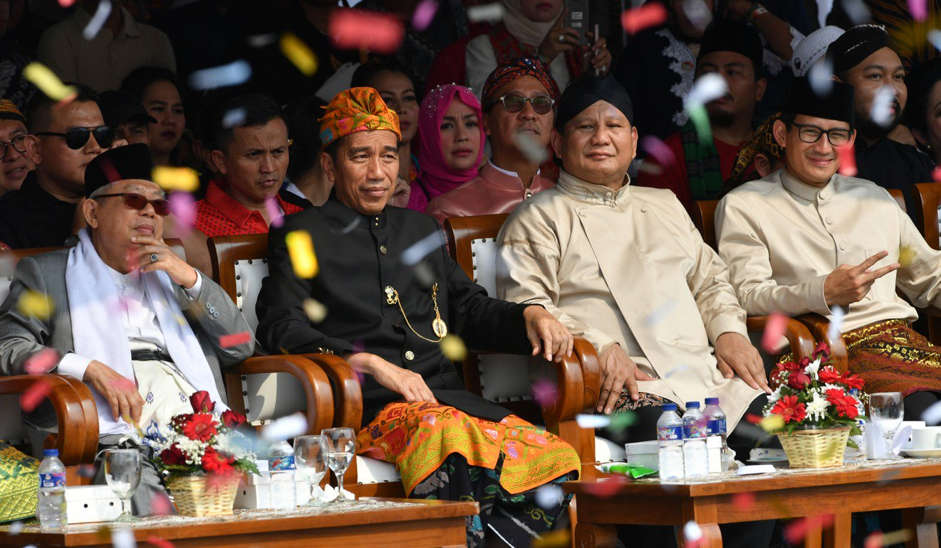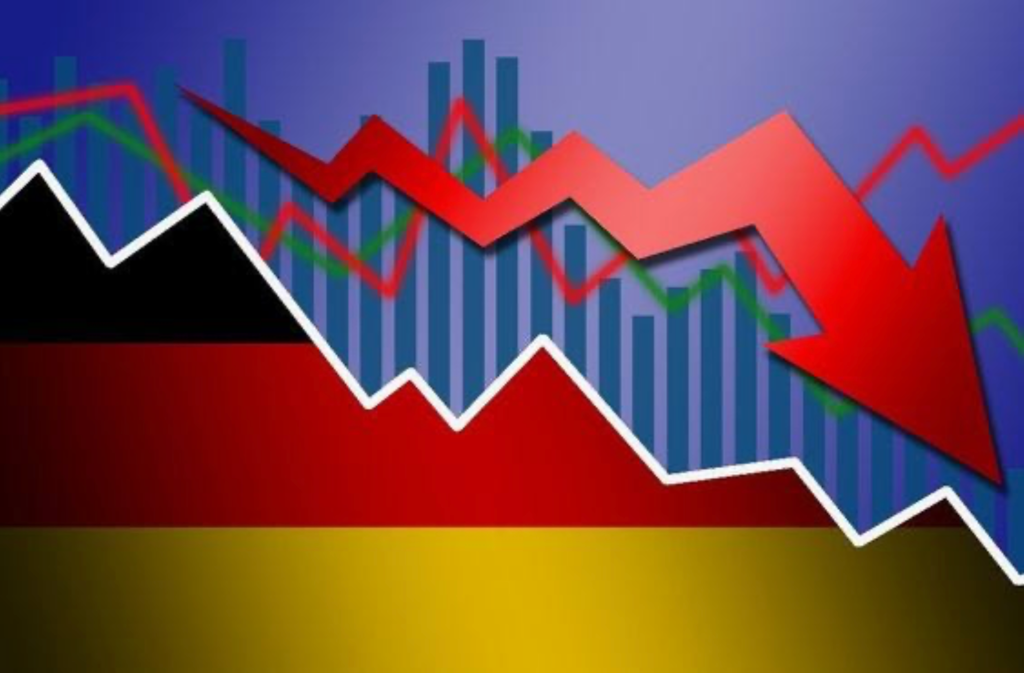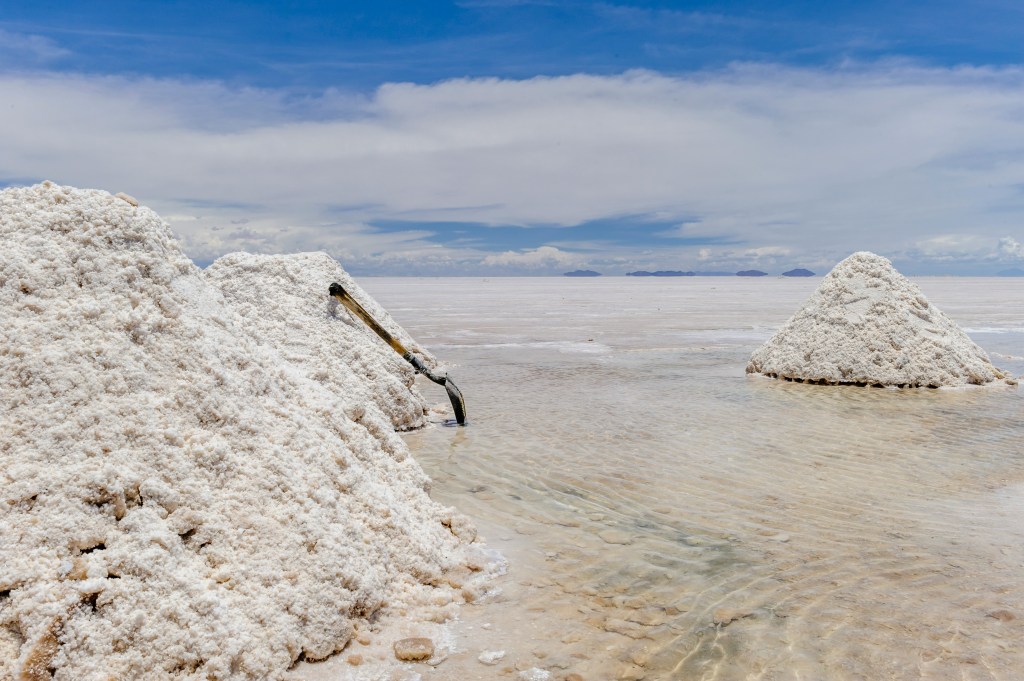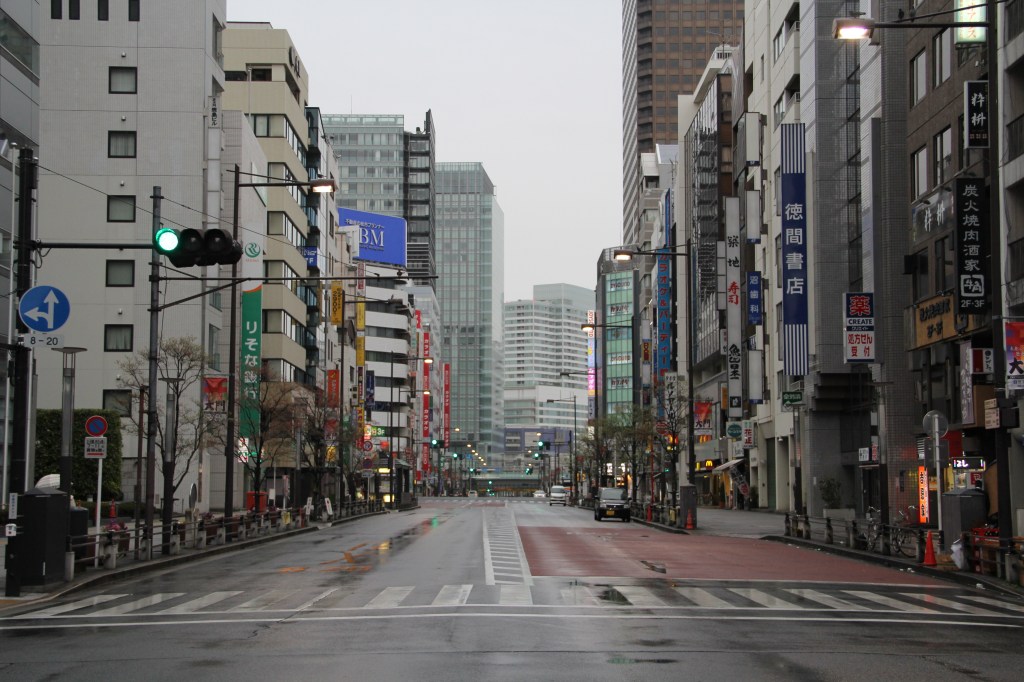By: Gerald Steven
From left to right: Ma’ruf Amin, Joko Widodo, Prabowo Subianto, and Sandiaga Uno.
Indonesia, the third largest democracy in the world, is set to hold its next Presidential election in April 2019. To the 190 million registered voters, the 2019 Presidential election feels all too familiar: the same two candidates who ran in 2014 are also running this year. Indonesia’s current President, Joko Widodo, is running for re-election with Ma’ruf Amin as Vice President. His opponent, Prabowo Subianto, is running for President with Sandiaga Uno as Vice President. Though Joko Widodo and Prabowo Subianto are prominent figures in Indonesia, their background and policies are relatively unknown to the rest of the world. This article will explore these figures and their political aspirations, and they will mean for future Indonesia.
Joko Widodo and Ma’ruf Amin
Joko Widodo, also known asJokowi, is a former furniture salesman from Solo, Central Java. His political career began when he served as mayor of Solo in 2005 and later as governor of Jakarta in 2012. He is affiliated with the centric-left Indonesian Democratic Party of Struggle (PDI-P). Jokowi’s running mate, Ma’ruf Amin, is a conservative Islamic scholar and lawmaker who is also the chairman of the country’s largest body of clerics, the Indonesian Ulema Council (MUI). He previously served as the leader of the largest mass Muslim organization, Nahdlatul Ulama (NU), boasting 40 million members and considerable political influence.
Amin is known for his conservative stance on certain subject matters. In 2005, Amin issued a fatwa – a general decree in Islam by a religious authority – that declared liberalism, pluralism, and secularism as against the rule of Islam. He also has expressed support for female genital mutilation and capital punishment for those committing same-sex acts. In a 2018 interview with Al Jazeera, Amin described being LGBT as a “violation”. Human rights groups also reported that Amin has played a critical role in promoting intolerance in the largest Muslim majority country in the world. The fatwas issued by Amin and MUI caused a surge in violent attacks towards the LGBT community and social minority groups.
Political analysts speculate that Jokowi selected Ma’ruf Amin to prevent criticisms from hardline Islamic groups. During the 2017 election for governor of Jakarta, Amin testified against and condemned Basuki Tjahaja Purnama, governor of Jakarta at the time, as a blasphemer. Basuki, also known as Ahok, is an ethnic Chinese Christian, who was accused for insulting the Qur’an. He was then sentenced to two years in prison after losing the election.
Jokowi mentioned during the Presidential debate in January that his presidency will tackle key issues, such as corruption, terrorism, law reform, and human rights. He is also committed to infrastructure improvements and efforts to eradicate poverty – similar themes to his 2014 campaign. Amin on the other hand, was considerably quiet during the Presidential debate. He made little to no remarks on his policies and agenda. When the moderator asked Amin for any comments on Jokowi’s statement regarding law enforcements, Amin said to the moderator, “The answer is sufficient. I agree with Pak Jokowi’s statement.”
Jokowi’s current administration has mainly focused on improving the country’s infrastructure by spending billions of dollars to add toll roads, ports, dams, and airports. When he was elected President in 2014, he funded his infrastructure and social programs by cutting fuel subsidies. His projects are part of an effort to better connect the country’s 17,000 islands and transform the country into a commodity-reliant economy. Critics however, have pointed out that his construction projects have caused delays and cost blow-outs. The country has experienced steady annual growth of 5% as a result; slightly below Jokowi’s target to raise economic growth by 7%.
Jokowi is also popular among young Indonesians because of his appeal to popular culture and his efforts to improve living standards for young people, such as Kartu Indonesia Sehat (Healthy Indonesia Card), Kartu Indonesia Pintar (Smart Indonesia Card), and Badan Penyelenggara Jaminan Sosial Kesehatan (Social Assurance Scheme). Baiq Wardhani, a Politics lecturer at Airlangga University in Surabaya stated that “Jokowi’s policies have often sided with young people and touched the grassroots level.”
While Jokowi is currently leading in opinion polls, Jokowi would need to focus on his religious credentials, his ability to improve Indonesia’s economy, and fulfilling his 2014 campaign promises if he wants to be re-elected in 2019. Ian Wilson, a lecturer ofpolitics and security studies and research fellow at the Asia Research Centre at Murdoch University said that Jokowi “has made little progress economically, the investment in infrastructure has been fraught with problems and yet to bear fruit, and he’s shown to be deeply illiberal in many aspects.” Wardhani also asserted that Jokowi has failed to deliver on his 2014 campaign promises to address human rights violations in Indonesia. Amnesty International reported that in Papua, the poorest region in the archipelago, killings of locals by security forces continue to happen and have yet to be addressed. Jokowi has also been criticized for having done little to help minorities, non-Muslims, and the LGBT community.
If Jokowi wins for a second term, it can be predicted that Jokowi will continue to carry on his infrastructure projects with hopes of boosting the economy, though these projects are unlikely to stimulate any growth until they are completed. With Ma’ruf Amin as Vice President, Indonesia could expect to pass more conservative laws, but doing so will stir conflict and criticism since conservative policies were initially not part of their campaign agenda. Their win would also reveal that although Indonesia has a growing support for hardline Islam, the majority of Indonesians are still being risk averse when it comes to voting for President, and would rather vote for an incumbent rather than a newcomer.
Prabowo Subianto and Sandiaga Uno
Prabowo Subianto is a former son-in-law of Soeharto, Indonesia’s former military leader and dictator between 1967 to 1998. He is known for his strong nationalistic message and military background, as he once served as the Lieutenant General of the Indonesian National Armed Forces. But early in his military career, human rights groups have accused Prabowo for committing human rights abuses.
Human rights groups have called for an investigation over allegations that Prabowo once ordered the massacre of nearly 300 civilians during the Indonesian invasion of East Timor in the 1980s. He is accused for the abduction and torture of 23 pro-democracy activists in 1998, and for organizing riots in May 1998 before Soeharto resigned as President. The riots of 1998, which still haunts Indonesian minority groups today, resulted in more than 1000 deaths and the rapes of at least 168 women. He has denied the allegations so far and has never been charged with a crime.
Sandiaga Uno, Prabowo’s Vice President running mate, is the former deputy-governor of Jakarta. Uno is a prominent businessman who worked in investment banking before starting a private equity firm in 1998. As of June 2018, Globe Asia Magazine estimated his wealth at $500 million. There has been speculation that Prabowo chose Uno because of his ability to fund the campaign rather than his political views, given that he only entered into politics very recently.
Prabowo’s platform emphasizes strong leadership, law and order, and economic nationalism. During a televised speech at the Jakarta Convention Centre in January, Prabowo mentioned thatto “increase people’s purchasing power, we must stop the flow of money abroad. We must work so that money flows into the Republic of Indonesia.”
Following his economic nationalistic message, Prabowo called for a review of Indonesia’s economic relations with China- Indonesia’s largest trading partner. Irawan Ronodipuro, director of foreign affairs for Prabowo’s campaign, stated that Prabowo plans to “seek” a better deal with China, in light of Indonesia’s trade deficit in 2018.
Despite his previous allegations for committing human rights abuses, Prabowo claimedthat he will “fight for all Indonesians regardless of their ethnicity, religious group,whatever their race.” As he filed his campaign paperwork, “All Indonesians, our people, we will defend, we will fight for their rights.”
If Prabowo wants to catch up with Jokowi, he would need to appeal to swing voters and to the undecided, according to Yunarto Wijaya, executive director of Charta Politika. Prabowo would also need to appeal to a specific larger set of audience. Yohanes Sulaiman, a political analyst and lecturer at Jenderal Achmad Yani University, said that people are “siding with Prabowo not because he’s inspiring, but because they (are) all united with their dislike of Jokowi, and that’s not really a good way to excite people.”
Prabowo’s Presidential win could mark a pivotal point in Indonesian history. His presidency has the potential to be nationalistic and militaristic, similar to that of Jair Bolsonaro’s, the recently elected President of Brazil . The economy under Prabowo will most likely be heavily focused on improving the domestic economy, and the country would be more cautious before starting trade deals with other countries.
His militaristic policies and background is also reminiscent of the Soeharto era, a time characterized by widespread discontent and unrest for many Indonesians. The country could see more laws being passed that are in favour of the majority group: Indonesian Muslims. If more laws are passed solely to benefit the majority, Indonesia would stray away from its commitment to secularism and tolerance, and minority groups will be at risk of systemic and institutionalized discrimination.
The winner of the 2019 Indonesian Presidential election will be announced in April. Regardless of who wins the election, Indonesia is expected to move closer to conservatism. The 2019 Presidential campaign demonstrates how religion is playing an increasingly important role in Indonesian politics. Alexander Raymond Arifianto, a research fellow at the S. Rajaratnam School of International Studies in Singapore, reported that religion and identity politics are a “far more salient issue” in this year’s election. Arifianto’s statement is already evident in Jokowi’s use of religion to boost his approval ratings, and Prabowo’s hardline Islamic agenda.
Minority groups will also be at a loss because of this year’s Presidential election. Veronica Koman, a Jakarta-based Indonesian human rights lawyer, told Al Jazeera that “one candidate is an accused perpetrator of human rights violations, while the other one lets impunity flourish under his administration.” Neither candidates in this year’s election are endorsed by Indonesia’s main indigenous alliance, Aliansi Masyarakat Adat Nusantara (AMAN), although AMAN endorsed Jokowi in 2014. Tolerance, pluralism, and liberalism – the values that Indonesia have been upholding – are at stake at this year’s election. Once a beacon of tolerance and leader of promoting Islamic democracy, Indonesia will soon have to decide what ideals they want to offer to the rest of the world.
Works cited:
Image source: Yuniar, R. (2018, October 22). Indonesia to Review China’s Belt and Road Projects If Prabowo Beats Widodo in Presidential Election. South China Morning Post. Retrieved from: https://www.scmp.com/week-asia/geopolitics/article/2169655/indonesia-review-chinas-belt-and-road-projects-if-prabowo
Aditya, A., Singgih, V., Sipahutar, T. (2019, January 16). Indonesian Presidential Candidates Debate Corruption, Terrorism. Bloomberg. Retrieved from: https://www.smh.com.au/world/asia/jokowi-vs-prabowo-indonesian-presidential-debate-robotic-risk-averse-20190117-p50s2r.html
Allard, T., Suroyo, G. (2018, August 10). Factbox: Indonesia’s presidential and vice-presidential candidates? Reuters. Retrieved from:https://www.reuters.com/article/us-indonesia-politics-candidates-factbox/factbox-indonesias-presidential-and-vice-presidential-candidates-idUSKBN1KV0J3
Cochrane, J. (2018, August 11). Indonesia’s Presidential Race Takes Shape, in Shadow of Hard-Line Islam. The New York Times. Retrieved from: https://www.nytimes.com/2018/08/11/world/asia/indonesia-presidential-election.html
Gokkon, B. (2019, January 2). Once bitten, Indonesia’s indigenous alliance won’t endorse 2019 candidates. Mongabay News. Retrieved from: https://news.mongabay.com/2019/01/once-bitten-indonesias-indigenous-alliance-wont-endorse-2019-candidates/
Llewellyn, A. (2019, January 16). Indonesia presidential candidates to face off in firstTV debate. Al Jazeera. Retrieved from: https://www.aljazeera.com/news/2019/01/indonesia-presidential-candidates-face-tv-debate-190116020042130.html
Maulia, E. (2019, January 18). Widodo running mate Amin seen as weak link in presidential race. Nikkei Asian Review. Retrieved from: https://asia.nikkei.com/Politics/Widodo-running-mate-Amin-seen-as-weak-link-in-presidential-race
Tay, S. (2019, January 21). Religion and economy will take center stage as Indonesia’s president seeks re-election, experts say. CNBC. Retrieved from: https://www.cnbc.com/2019/01/21/indonesia-politics-religion-economy-key-to-widodos-re-election.html






Leave a comment